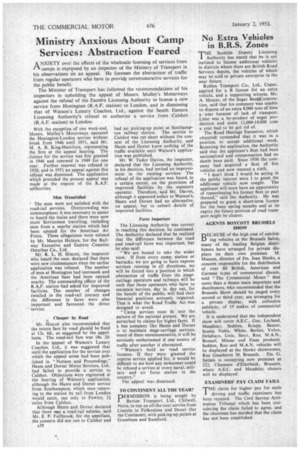Ministry Anxious About Camp Services: Abstraction Feared
Page 30

If you've noticed an error in this article please click here to report it so we can fix it.
A NXIETY over the effects of the wholesale licensing of services from r-k camps is expTsed by an inspector of the Ministry of Transport in his observations on an appeal. He foresees the abstraction of traffic from regular operators who have to provide unremunerative services for the public benefit The Minister of Transport has followed the recommendations of his inspectors in upholding the appeal of Messrs. Muiley's Motorways against the refusal of the Easte-rn Licensing Authority to license a new service from Honington (R.A.F. station) to London, and in dismissing that of Watson's Luxury Coaches, Ltd., against the South Eastern Licensing Authority's refusal to authorize a service from Calshot (R.A.F. station) to London.
With the exception of one week-end, Messrs. MuIley's Motorways operated the Honington-London service without break from 1946 until 1951, said Mr. M. A. B. King-Hamilton, representing the firm at the appeal hearing. The _licence for the servile was first granted in 1946 and renewed in 1949 for one year. Further renewal was refused in 1950, and in 1951 an appeal against this refusal was dismissed. The application which preceded the present appeal was made at the request of the R.A.F. authorities.
Men Dissatisfied
The men were not satisfied with the road-rail services. Overcrowding was commonplace; it was necessary to queue to board the trains and there were now more Servicemen travelling, including men from a nearby station which had been opened for the American Air Force. These allegations were refuted by Mr. Maurice Holmes, for the Railway Executive and Eastern Counties Omnibus Co., Ltd.
Mr. R. L. H. Hiscott, the inspector who heard the case, declared that there were new circumstances since the earlier application was refused. The number of men at Honington had increased, and the American base had been opened nearby. The commanding officer of the R.A.F. station had asked for improved facilities. The number of changes entailed in the road-rail journey and the difference in fares were also important and favoured the direct —Service. Cheaper by Road
a Mr. Hiscott also recommended that the return fare by road should be fixed at 12s. 6d., as suggested by the appellants. The road-rail fare was 18s. 2d.
In the appeal of Watson's Luxury Coaches, Ltd., it was suggested that until the application for the service over which the appeal arose had been published in "Notices and Proceedings," Hants and Dorset Motor Services, Ltd., had failed to provide a service to ealshot. Objections were registered at the hearing of Watson's application, although the Hants and Dorset service from Southampton, which men returning to the station by rail from London would catch, ran only to Fawley, 2i miles from Calshot.
Although Hants and Dorset declared that there ss a road-rail scheme, said Mr. E. P. Fullbrook. for the appellant, the concern did not run to Calshot and A28 had no picking-up point at Southampton railway station. The service to Calshot was cut short without the consent of the Licensing Authority, and Hants and Dorset knew nothing of the traffic available until Watson's application was published.
Mr. W. Tudor Davies, the inspector, declared that the Licensing Authority, in his decision, had invited an improvement in the existing services. The refusal of the application was based, to a certain extent, on the provision of improved facilities by the statutory operator. Therefore, said Mr. Davies, although it appeared unfair to Watson's, Hants and Dorset had no alternative, on appeal, but to submit details of improved facilities.
Fares Important
The Licensing Authority was correct in reaching this decision, he continued. The Authority declared that he realized that the difference between the road and road-rail fares was important, but he also said: "We are bound to take the wider view. If from every camp, station or barracks, we are going to have express services running in all directions, we will be forced into a position in which abstraction of traffic from the stagecarriage operators and railways will be such that those operators. who have to maintain services, day in, day out, for the benefit of the public, will find their financial positions seriously impaired. That is what the Road Traffic Act was designed to avoid.
"Camp services must fit inter the pattern of the national picture. We are perturbed by claims for higher fares. If a bus company like Hants and Dorset is to maintain stage-carriage services, many of them unremunerative, it will be seriously embarrassed if one source of traffic after another i abstracted.
"Watson's hold no road service licences. If they were granted the express service applied for, it would be difficult to see how any newcomer could be refused a service at every naval, military and air force station in the country."
The appeal was dismissed.
TO CONTINENT ALL THE YEAR?
PERMISSION is being sought by Barton Transport, Ltd., Chilwell, Notts, to run an all-the-year service from Lincoln to Folkestone and Dover (for the Continent), with picking-up points at Grantham and Stamford.




















































































